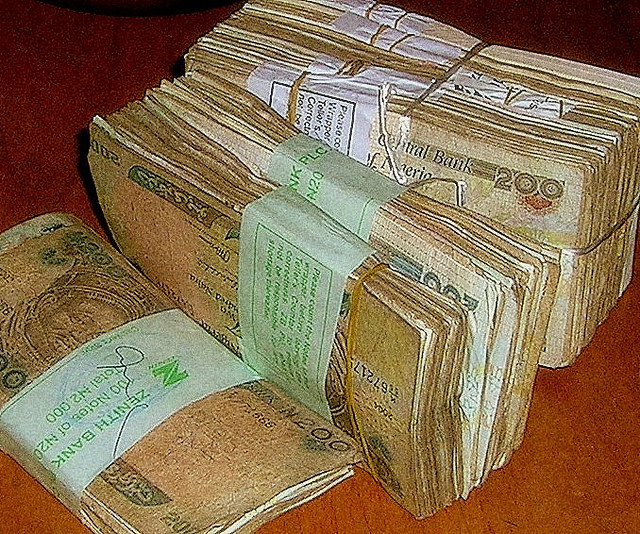“Corruption subverts and undermines democracy”
July 14 Corruption undermines democracy and cripples Nigeria’s development, writes Musa Temidayo, 23, a Correspondent from Nigeria. He says though corruption pervades Nigerian society, the question is how to solve the issue.
Corruption undermines democracy and cripples Nigeria’s development, writes Musa Temidayo, 23, a Correspondent from Nigeria. He says though corruption pervades Nigerian society, the question is how to solve the issue.
According to Carl Friedrich, corruption “is deviant behavior associated with a particular motivation, namely that of private gain at public expense.”
In developing countries, corruption continues to be one of the greatest factors of poverty, development and internecine conflicts. Even with our natural endowments and valuable natural resources, Nigeria is still ranked among the poorest countries of the world.
There are many unresolved problems in Nigeria, but the issue of the upsurge of corruption is troubling and the damage it has done to the polity is astronomical. Corruption as evidently shown has deep roots in every section of Nigerian society.
Nigerian society is obviously a chaotic one where dreams and aspirations of the “common man” remain unrealized. With shock and unbelief, we have all seen the endemic corruption, moral decay and political morass that have become part and parcel of our society. Different people from different walks of life have tried to suggest a way of proffering solutions for the ills of society.
The menace of corruption leads to slow movement of files in offices, police extortion, slow traffic on the highways, port congestion, queues at passport offices and gas stations, ghost workers syndrome, election irregularities, and examination malpractices among others. Even the mad people on the street recognize the havoc caused by corruption – the funds allocated for their welfare disappear into thin air. Thus it is believed by many in the society that corruption is the bane of Nigeria.
Corruption can be felt in every sector of the Nigerian society. In the present-day civil service, office holders embezzle and over-price budgets on daily basis. It flows upward and downward. The “oga at the tops” – who are not concerned if the task set before them is accomplished – tend to use various means available to amass wealth for their own personal consumptions. Nevertheless, other workers under these “ogas” wouldn’t want to play “the righteous one” and get tagged as “mumu” by fellow workers or friends. They also find other subtle ways to have his share of the resource. This presupposes that in an environment where an individual sees others around him/her benefiting from corruption, they may well choose to indulge too.
Consequently, the issue keeps reoccurring in every academic and informal discussion in Nigeria. And the issue will hardly go away! Some writers say that corruption is endemic in all governments, and that it is not peculiar to any continent, region and ethnic group. It cuts across faiths, religious denominations and political systems and affects both young and old, man and woman alike.
The causes of corruption are numerous in Nigeria. For example, patronage ties between political elites and those they represent often place heavy informal obligations and demands on the former. Such obligations are almost always fulfilled through corrupt means. Thus the participants in corruption are many besides the politician or elite who actually engages in the act.
Also, a weak judicial system is a serious cause of corruption. Most often, judicial systems are weak as a result of poor conditions of service. In such situations, it is the poor people that suffer the brunt of injustices as the rich stand a better chance of getting justice over the poor. For example, a judge may allow or exclude evidence with the aim of justifying the acquittal of a guilty defendant of high political or social status. Judges or court staff may manipulate court dates to favor one party or another. Junior court personnel may ‘lose’ a file – for a price, as we witnessed during one of the numerous high-profile cases of corruption.
The impact of corruption in Nigeria cannot be overemphasized; even a day old baby can feel it if possible. The results are often disastrous. Corrupt officials may accept substandard quality of service because of kickbacks, thus depriving the country of value-added service from contractors and consequently resulting in the construction of water-washed roads or poorly-built schools.
One of the greatest impacts of corruption normally arises out of the choices and priorities of governments. This occurs when the real development priorities of a country are neglected in favour of those that generate the greatest personal gains for the decision makers. Here, it is clearly evident that many projects have become white elephants and easy routes for personal enrichment.
Corruption erodes the moral fabric of every own society, and violates the social and economic rights of the poor and the vulnerable. The truth is that what is stolen by a few rogues cannot be made available for the mass need of the desperate poor multitude. Dangerously too, corruption undermines democracy and subverts the rule of law which is the basis of every civilized society. Corruption retards development.
The questions this article tends to ask are – can the issue of corruption ever be a thing of the past in Nigeria? Must one swim in the same river of corruption before one is relevant in the society?
Corruption is an endemic disease that has eaten up every facet of the Nigerian society.
“Unless every individual creates a pocket of sanity and integrity in every place we find ourselves, the issues of corruption will continue to be a nightmare,” says Dr. Charles Ukeje.
Together we can defeat the worst enemy that has crippled our nation, reduced our citizens to poverty and deprived our nation of any sustainable development.
photo credit: quiquemendizabal via photopin cc
———————————————————————————————————————————————-
About me:
I am from Nigeria, currently studying International Relations at Obafemi Awolowo University Ile-Ife Osun state. I’m also the Deputy Editor-in- Chief for the department. I love travelling and singing. I have interest in Management and Developmental Issues.
Aside from studying, I also work with I-Koncept-as a Director of Logistics, and also the Chairman of my department’s magazine. I want to be a Manager-Human Resource & Conflict Management, and also hope to serve in Nigerian Foreign Service.
—————————————————————————————————————————————–
Opinions expressed in this article are those of the author and do not necessarily represent the views of the Commonwealth Youth Programme. Articles are published in a spirit of dialogue, respect and understanding. If you disagree, why not submit a response?
To learn more about becoming a Commonwealth Correspondent please visit: http://www.yourcommonwealth.org/submit-articles/commonwealthcorrespondents/
—————————————————————————————————————————————-




